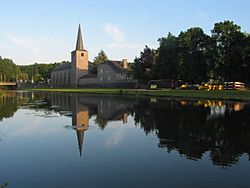Hotton facts for kids
Quick facts for kids
Hotton
Houton (Walloon)
|
|||
|---|---|---|---|

The church.
|
|||
|
|||
| Country | Belgium | ||
| Community | French Community | ||
| Region | Wallonia | ||
| Province | Luxembourg | ||
| Arrondissement | Marche-en-Famenne | ||
| Area | |||
| • Total | 57.32 km2 (22.13 sq mi) | ||
| Population
(2018-01-01)Lua error in Module:Wd at line 1575: attempt to index field 'wikibase' (a nil value).
|
|||
| • Total | Lua error in Module:Wd at line 1,575: attempt to index field 'wikibase' (a nil value). | ||
| Postal codes |
6990
|
||
| Area codes | 084 | ||
| Website | www.hotton.be | ||
Hotton is a town in Wallonia, Belgium. It is located in the province of Luxembourg.
The town is about 12 kilometers (7.5 miles) from Marche-en-Famenne. It sits in the beautiful Ardennes region. More than 5,400 people live in Hotton. The Ourthe River flows right through the town.
Hotton is made up of several smaller areas called districts. These include Hampteau, Hotton, Marenne, and Fronville. There are also tiny villages, known as hamlets. Some of these are Bourdon, Deulin, and Ny.
The town is part of the Marche-en-Famenne area. To its west, it shares a border with the province of Namur.
Contents
History of Hotton
Early Times and Medieval Period
The first signs of Hotton's history go back to Roman times. Back then, Hotton was a type of fortified settlement called an oppidum. Many Roman artifacts have been found at a place called Ti-Château. This was a strong Roman camp.
The village of Hotton was first written about in old documents in 1187. It was called Hottine back then. For a long time, Hotton was part of the medieval county of La Roche. This lasted until the 16th century. Then, the lords of Montaigu took control. In 1791, Hotton became a free village.
World War II and the Battle of the Bulge
On May 11, 1940, during the Battle of Belgium, German forces captured Hotton. Allied soldiers tried to blow up the steel bridge over the Ourthe River. They hoped to slow down the German advance, but they were not successful.
Hotton played a very important part in the Battle of the Bulge. This was a major battle in World War II. German troops reached their furthest point west right here in Hotton. But they were stopped by the American 84th Infantry Division.
Modern Hotton
The current municipality of Hotton was created in 1977. This happened when the nearby areas of Hampteau, Fronville, and Marenne joined with Hotton.
The Hotton War Cemetery is also located here. It is a burial ground for British soldiers who died in World War II.
Things to See and Do in Hotton
Hotton is a very popular place for visitors. It is well-known for its amazing speleothem caves. These are called the Caves of Hotton.
Just outside Hotton, there is a small war cemetery. It is managed by the Commonwealth War Graves Commission. This cemetery has 660 graves.
Other interesting places to visit include Deulin Castle. There is also the Virgin of Werpin statue and the old Faber Mill. You can also see St. Peter's Church, Melreux and the Riveo Centre.
Hotton hosts a famous hot air balloon festival every August. It is called Hottolfiades. The town's annual fair is also held in August. People say it is the biggest fair in the whole area.
Famous People from Hotton
- Guillaume de Waha-Baillonville (1615–1690), a historian who was born in Melreux.
See also
 In Spanish: Hotton para niños
In Spanish: Hotton para niños




